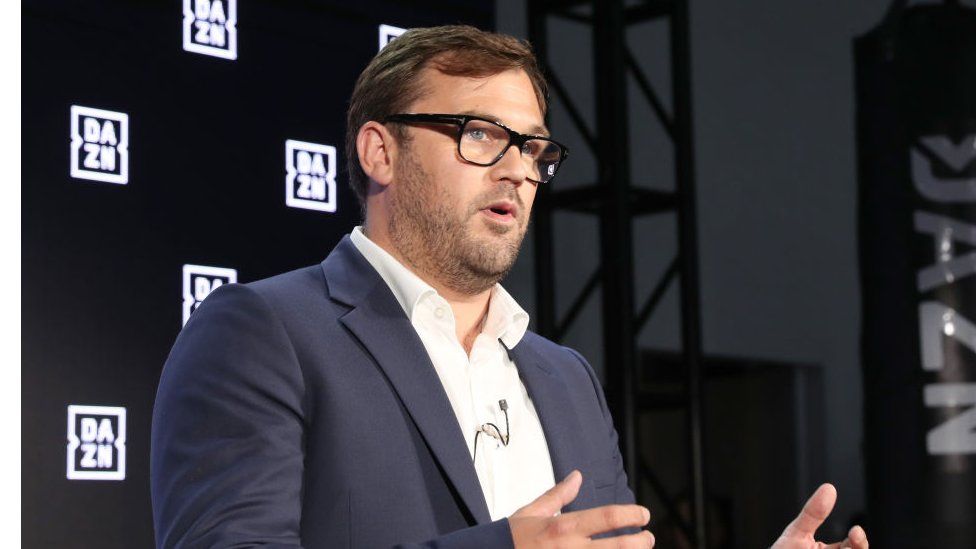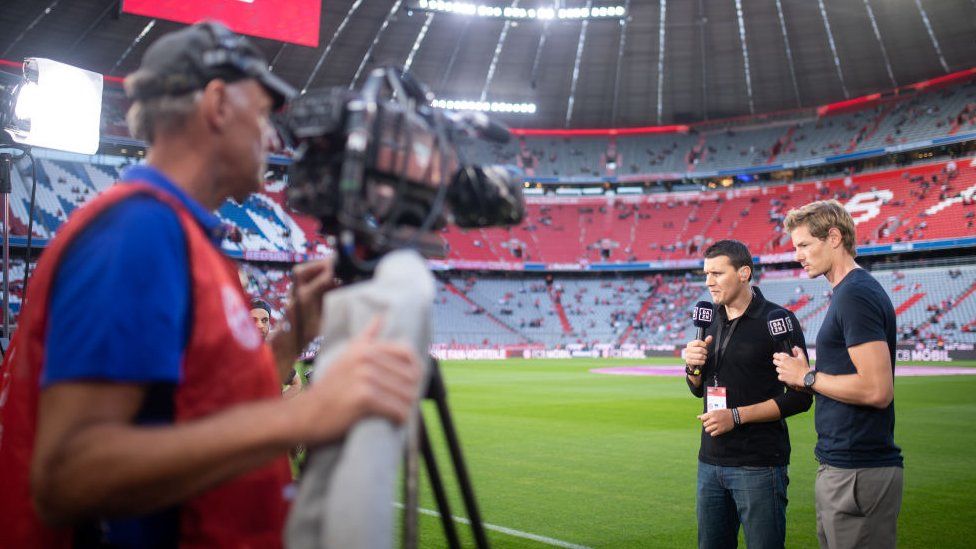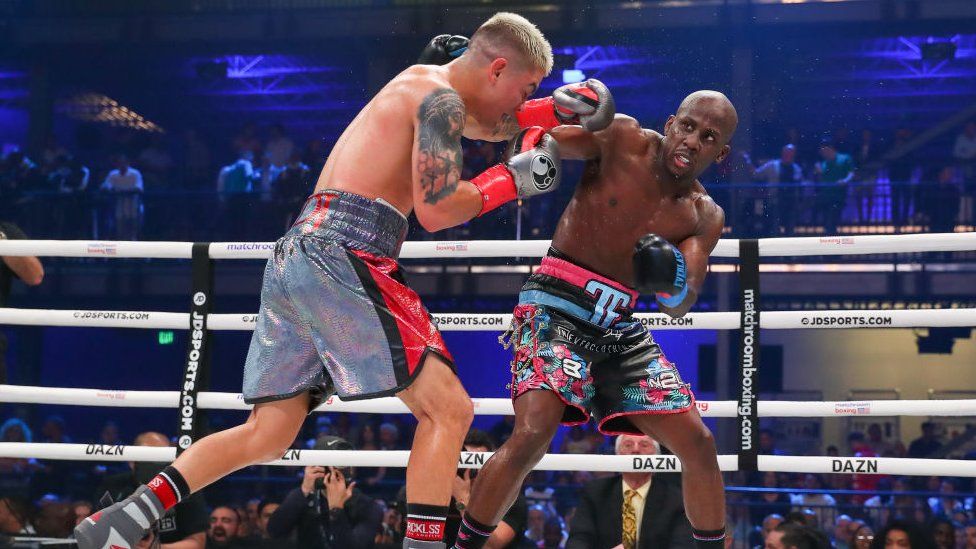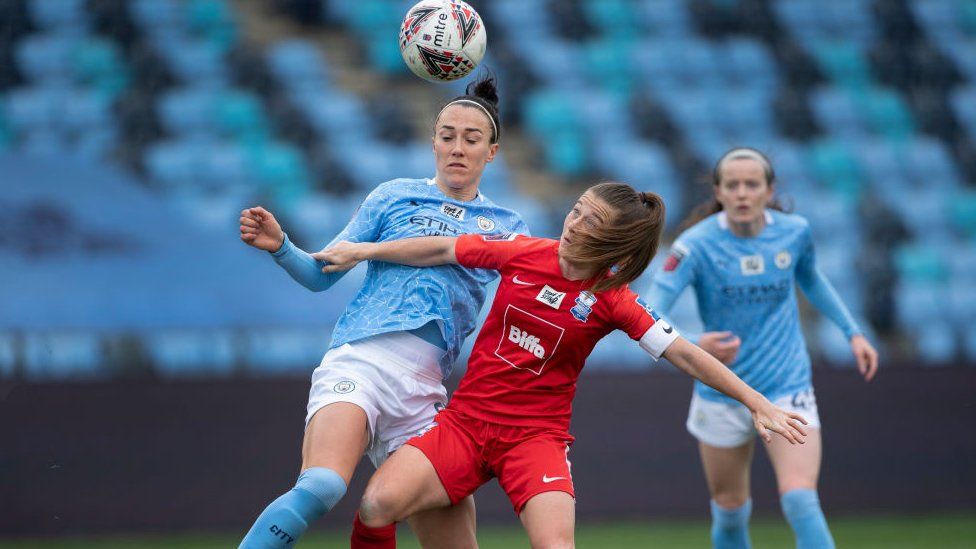
The boss of sports streaming service DAZN has told the BBC that the platform will expand to introduce "things like wagering, betting, fantasy and commerce".
Chief executive James Rushton says it will become "a sports destination platform" over the next 12 months and that profitability for the loss-making company is coming "in the near future".
New services could help by boosting subscriber numbers.
Analysts have questioned how the company will recoup the billions of dollars it has spent globally on sports rights.
The BBC understands that about 15 million people around the world have now subscribed to the internet service, which is trying to disrupt the TV sports industry worldwide.
Local rights crucial
It recently struck a major deal to show boxing in the UK and is an established presence in Japan, where it shows local J-League football and baseball, and in Germany, where its rights include Bundesliga and Champions League football.
In other countries, a lot of the rights owned by the "Netflix of sports" are currently for televising less popular sports, but premium local rights are seen as crucial for attracting subscribers.

"The more revenue streams you can diversify across, the stronger your proposition will become," says Alistair Taylor, a consultant at the Sports Consultancy. He says rights holders increasingly see DAZN as a creditable alternative to existing broadcast partners.
The new services "will really resonate with the younger demographic, and one of sport's biggest problems is cracking that younger demographic such as Gen Z", he adds.
As a private company, DAZN doesn't publish user numbers, but is likely to have received a boost in Italy, where it has made a big bet as it continues its European expansion.
A deal that starts with the 2021-22 season means it is the only company with rights to show all the matches in football's big-money Serie A.
That has meant trebling subscription prices to €29.99 (£25.50) a month to cover the cost of a deal that is reportedly setting it back €840m a season.
Too many subscriptions?
As DAZN seeks to snap up more premium rights around the world, similar price increases could be on the cards and Mr Rushton believes customers will be willing to pay.
As the "quality of our rights portfolio increases and becomes more exclusive, we have shifted the price up", he says.
"But again - and this is really important, it goes to what we believe in as a business - the price is still more affordable and more accessible than ever before."
In the UK, DAZN is reportedly in talks to buy BT Sport, a move that would give it access to live events including Premier League football, Premiership Rugby and Moto GP.
With viewers having to make an increasing number of payments to watch all the content they want, Mr Rushton doesn't believe "subscription fatigue" will be a problem.
"A passionate sports fan will always want to see his or her team play his or her superstar play. And that's why we love, and that's why we operate in, the world of sport," he says.

Many companies have tried and failed to break into sports broadcasting because the rights are so expensive.
But by offering its service to customers primarily over the internet rather than via satellite or cable, Mr Rushton believes DAZN, which is owned by the UK's richest man Len Blatvanik, has an advantage over previous disruptors to sports broadcasting.
"We're more efficient, and more effective than a linear TV broadcaster. We can maintain the quality of our product and our broadcast, but doing it over the internet," he says.
He adds that being "more cost-effective" means "you can put more money into the content, more money into the rights and still make a healthy margin".
"There are more streaming households, more people paying for streaming services, in most developed markets than there are traditional linear pay-TV homes. So I think that's that change happened. It's not for tomorrow. It's not for the future. It's now."

Streaming rivals traditional TV
Francois Goddard, a media analyst at Enders Analysis, believes those savings are limited. He points out that in Spain, DAZN content is also available via "traditional linear channels".
"Look at the price of satellite channels today, it's no big savings, and online video is expensive because you need servers everywhere," he says.
This is a particular issue for sport because it is live and "everybody's watching at the same time", which increases the demand on the servers that are essential to relaying the live pictures into people's homes.
Mr Rushton says people have got used to watching online and the technological advances mean that even with low bandwidth, it is possible to receive an HD-quality signal.
"We put an awful lot of time, effort and money into broadcasting and making sure that our platform is as stable, and frankly, as good as if not better than linear TV."
With many sports rights tied up in long-term deals, DAZN is also seeking to increase user numbers by building audiences that do not already exist.

As women's football increases in popularity, it recently agreed to pay approximately $8m (£5.75m) a year for the worldwide rights to show the women's UEFA Champions League.
Despite the outlay, DAZN is giving the games away for nothing by showing them on its YouTube channel for the first two years of its five-year agreement.
Mr Rushton concedes that part of the idea is to lure fans in, so that they want to pay. For stars such as Manchester City's Lucy Bronze to be "a household name in the UK, we need to give her greater exposure than necessarily any pay-TV platform can provide".
It's a rare example of the type of global deal that DAZN would like to do more often. "Where they stand now [is] that they have actually created a network of local services in a number of countries" rather than a "globally integrated service" like Netflix, says analyst Mr Goddard.
There are, he says, limited savings to be made for a global sports broadcaster, because rights are sold geographically.

Start-up losses
Last year, during the coronavirus pandemic, DAZN was forced to suspend some rights payments. It also borrowed more than $1bn from Len Blavatnik's Access Industries, which followed a $1.8bn loss in 2019.
Mr Goddard says that "it's not sustainable the way it is" and that in the next few years, DAZN will either sell itself or "suddenly become much bigger" by buying a competitor.
However, James Rushton is "very positive about the future as a pure sports play streaming platform", saying "a lot of high-growth businesses obviously make a loss during their formative years".
When it comes to profitability, "we're near that point of maturation". He thinks that ultimately, DAZN will be successful because "we're dedicated and focused on providing greater value and greater stability to premium sports rights".
You can watch James Rushton's full interview on "Talking Business with Aaron Heslehurst" on BBC World News at 07:30 GMT and 16:30 GMT on Monday, 12:30 GMT on Tuesday and 07:30 GMT on Thursday.
https://ift.tt/37PyjDe
Sport
Bagikan Berita Ini














0 Response to "Streaming service DAZN seeks to shake up TV sport - BBC News"
Post a Comment